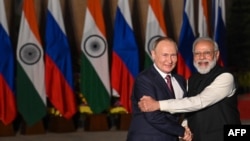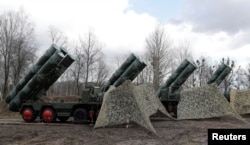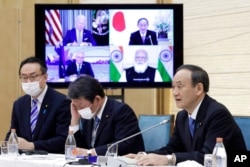Despite its growing strategic ties with the United States, India is resisting pressure from Washington to join the West and other countries in condemning Russia for its invasion of Ukraine for fear of alienating Moscow at a time when New Delhi views Beijing as its main threat, according to some analysts.
India stayed firm in its position at the United Nations over the past week, abstaining from both a Security Council resolution "deploring" Russian aggression and a General Assembly vote condemning the invasion.
Analysts say India does not want events in Europe to distract it from its own challenging security environment, where it faces archrivals China and Pakistan on its northern borders, and where Beijing has been pressuring India along the non-demarcated Himalayan heights, resulting in a huge troop build-up.
Deterring China
Alienating Russia would drive Moscow even closer to China and Pakistan, say some experts, leaving New Delhi increasingly isolated in a hostile region. Faced with China's expanding military capabilities, India cannot afford any break in the supply of military goods that flow from Moscow, which constitute more than two-thirds of the Indian military's weapons systems.
"India does not want to see an even tighter China-Pakistan-Russia axis. Were that to happen, Russia could, for example, come under pressure from Beijing not to give India arms, which it needs critically to meet the Chinese threat," said Manoj Joshi, distinguished fellow at the New Delhi-based Observer Research Foundation. "So, India finds it convenient to look the other way when Russia's interests are involved."
Even before the crisis over Ukraine erupted, India went ahead with the purchase of Russia's sophisticated S-400 anti-aircraft missile system despite the threat of U.S. sanctions because New Delhi considers it a crucial deterrence against China.
Indo-Russian ties
Just two months ago, Russian President Vladimir Putin paid a high-profile visit to India, where the two countries signed a 10-year defense cooperation agreement and firmed up a proposal to manufacture rifles in India.
Analysts also cite India's "historical experience" with Moscow dating back to the 1960s, pointing out that Russia repeatedly backed India in international forums. That included supporting it during the 1971 war that led to the creation of Bangladesh, using its veto when resolutions on Kashmir were introduced at the U.N., and supporting the controversial removal of Kashmir's special status in 2019.
In Washington, where strategic ties with New Delhi have grown over the last two decades, frustration over India's refusal to publicly condemn Russia are apparent. The U.S. State Department on Wednesday recalled a cable to American diplomats instructing them to inform Indian counterparts that their position on Ukraine put them in "Russia's camp." A State Department spokesperson later said the language in question was never intended for clearance and the cable was released in error.
US position
American officials say they are conducting a high-level dialogue with their Indian counterparts over Ukraine to "underscore the importance of a collective response condemning Russia's invasion."
"Let me say that all of us have been working to urge India to take a clear position, a position opposed to Russia's actions. But what have we seen so far? We have seen a number of abstentions," U.S. Assistant Secretary for State for South and Central Asia Donald Lu told members of the Senate Foreign Relations Committee on Wednesday.
"We work every day to make sure that we are trying to close the gap between where we are and where our Indian partners are," Lu said, adding that he hopes "India will find it is now time to further distance itself from Russia."
Analysts say that New Delhi, while staying neutral, has not been completely uncritical of Russia.
"India has said at the U.N. that international law and territorial integrity and sovereignty of countries has to be respected. That is indirectly sending a message to Russia that what it is doing is not acceptable without [naming] names," said Chintamani Mahapatra, professor of international relations at New Delhi's Jawaharlal Nehru University.
"India has taken a judicious position from its own standpoint and the U.S. knows India has its limitations," he said.
Quad
Amid U.S.-India differences over Russia, President Joe Biden on Thursday hosted a virtual meeting of the Quadrilateral Security Dialogue with India, Japan and Australia, a grouping that focuses on countering China's ambitions in the Indo-Pacific.
"I met with my fellow Quad leaders Prime Minister Scott Morrison, Prime Minister Narendra Modi, and Prime Minister Kishida Fumio about Russia's ongoing attack on Ukraine and our commitment to sovereignty and territorial integrity around the world, including in the Indo-Pacific," Biden tweeted after the meeting.
In its readout, however, New Delhi said Modi "underlined that the Quad must remain focused on its core objectives of promoting peace, stability and prosperity in the Indo-Pacific region."
Analysts say the hastily convened meeting was meant to put to rest speculation that India's insistence on maintaining a neutral stand on Russia would hurt the Quad.
"The government thinks that for any viable Indo-Pacific policy, the U.S. needs India and that will keep relations on a steady keel," said Joshi.
But India's struggle to balance ties with the U.S. and Russia could prove increasingly difficult as the crisis in eastern Europe worsens.
"So far, India is playing it by the ear, it is basically trying to duck and weave," Joshi said. "But pressure on India is mounting, and in the circumstances where a new kind of Cold War has come, the logic often becomes 'you're either with us or against us.'"






